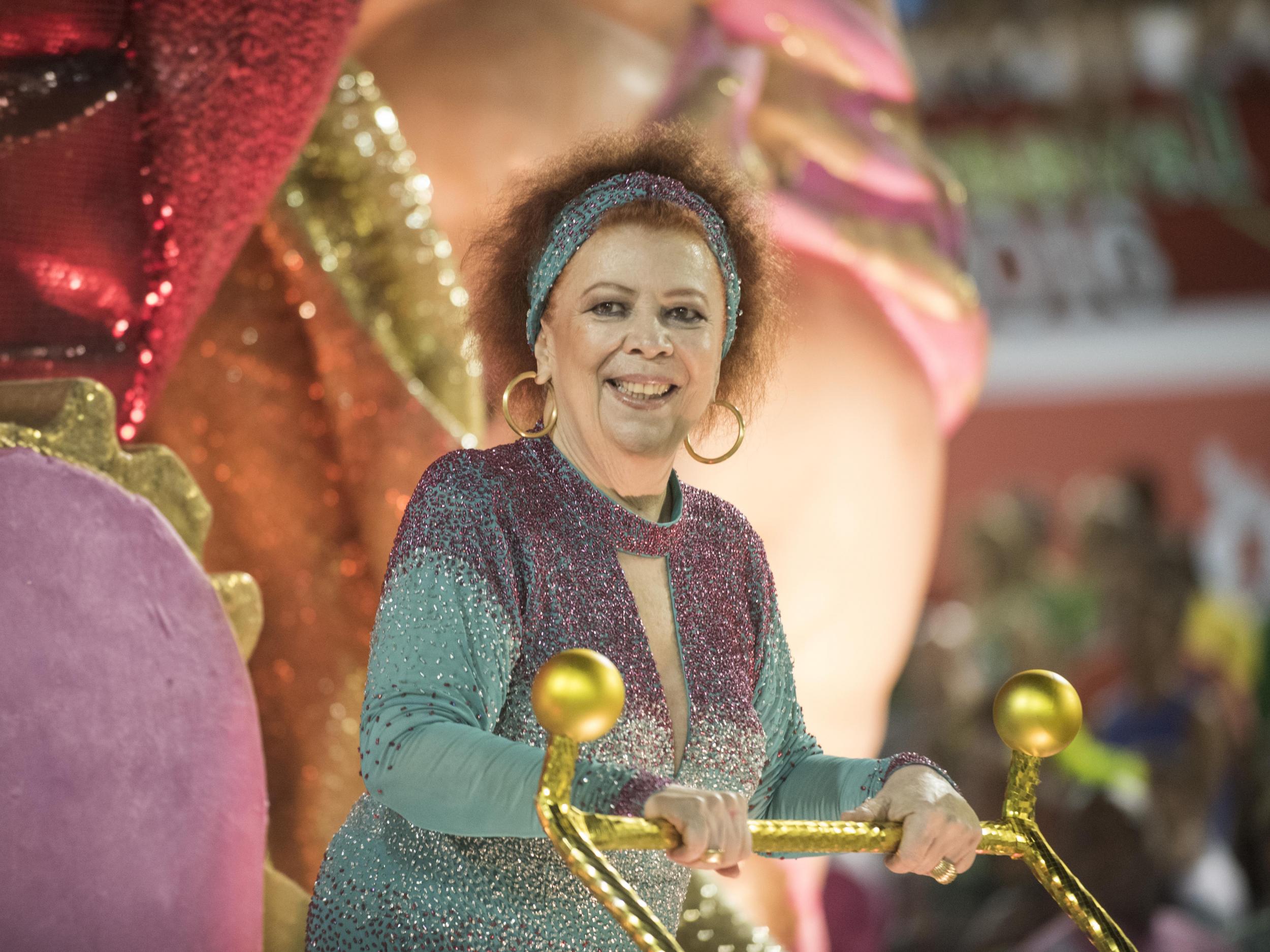Beth Carvalho: Samba singer who soundtracked Brazil's street parties and carnival
Carvalho played a crucial role in the development of the musical style, and also championed overlooked composers in her country

Beth Carvalho was an exuberant, smokey-voiced Brazilian singer who filled soccer stadiums with her followers, battled music-industry machismo and championed overlooked composers and performers – earning the nickname “godmother of samba”.
Carvalho, who has died aged 72, was among Brazil’s most celebrated singers, with a husky alto voice that soundtracked dances, street parties and the earsplitting, eye-widening carnival festival that signals the beginning of Lent.
Her music was by turns plaintive and life-affirming, backed by drums, bells, guitars, whistles and the ukulele-like cavaco or cavaquinho. One of her best-known songs, “Coisinha do Pai” (“Daddy’s Little Thing”), was so stirring it was used as a “wake-up” track for a rover on Nasa’s 1997 Pathfinder mission to Mars.
Carvalho performed bossa nova, jazz, protest songs and the forro party music of northeastern Brazil. But she was known above all for her commitment to the percussive, rhythmically distinct tradition of samba, which she called “the fountain from which all Brazilian music drinks”.
In a career that spanned five decades, she was credited with playing an “integral role in the history of Brazilian music” by the Latin Grammy Awards, which honoured her with a lifetime achievement award in 2009. More than many of her peers, she emphasised samba’s roots in the west African slave trade, calling it a music of political and social empowerment, not just of revelry and spectacle.
“Everybody knows the word ‘samba’,” she said in 1990. “Everybody knows what carnival is. But I think that samba itself, its essence, is not known, even in Brazil. Samba isn’t just a rhythm; it’s a resistance. The majority of samba composers are extremely humble people, with little instruction or scholarship. Most of them are black and extremely poor.”
Carvalho wrote campaign songs for Leonel Brizola, the socialist governor of Rio de Janeiro state, and was an electric, sequined presence at the Rio carnival, where she sat aboard floats or marched down the street, thick red hair cascading down her shoulders.
About 200 samba schools – social clubs, more or less – compete in parades at the carnival, with the largest groups battling at the downtown Sambadrome, which seats more than 70,000 people. Carvalho was a longtime member of the pink-and-green Mangueira, one of Rio’s most popular schools, but she also wrote songs for Portela, a frequent parade winner.
That a woman would play such a prominent role in samba’s premier event, and do so as a musician rather than a feather-clad dancer, was not a given when Carvalho began her career in the 1960s.
“The scene was very full of machismo,” she once said, recalling an era when many of the songs made light of domestic violence and sexual assault.
It helped, she said, that she knew how to play the cavaquinho. “Since I could already play, I was armed, and I wasn’t intimidated. In any case, I have samba in my veins. What else could I do?”
Elizabeth Santos Leal de Carvalho was born in Rio de Janeiro in 1946. Her father was a lawyer and left-leaning political activist who was arrested after the 1964 coup, which empowered a military dictatorship that ruled for two decades. He introduced her to singers Silvio Caldas and Elizeth Cardoso, and Carvalho studied guitar and music theory.
Inspired by singer and guitarist Joao Gilberto, she dipped into bossa nova with songs such as “Por Quem Morrer de Amor” by Ronaldo Boscoli and Roberto Menescal, and in 1968 placed third at the International Song Festival in Rio de Janeiro. Her performance of “Andanca” drew national attention; one year later, she recorded the song as the title track of her first album.
Since I could already play, I was armed, and I wasn’t intimidated. In any case, I have samba in my veins
Carvalho turned fully towards samba in 1971, when she released “Rio Grande do Sul na Festa do Preto Forro”, performed at Carnival by the samba school Unidos de Sao Carlos. She went on to sell hundreds of thousands of records in Brazil over the next decade, buoyed by hits such as “1800 Colinas”, “Olho Por Olho”, “Saco do Feijao” and “Vou Festejar”.
For the most part, she recorded the work of other songwriters, describing herself as a rescuer and discoverer of the young and the forgotten. Partly through her efforts, musicians and composers such as Nelson Cavaquinho, Guilherme de Brito, Luiz Carlos da Vila, Arlindo Cruz and Jorge Aragao are now well known across Brazil.
She also fostered the festive samba style known as pagode and rejuvenated the career of composer Angenor de Oliveira, known as Cartola, who was running a cafe when she began recording his songs. “Many people thought he had died,” Carvalho said in 1993. “Nowadays he is popular.”
Carvalho toured internationally and released live albums, including records made at the Montreux Jazz Festival in Switzerland and the Olympia concert hall in Paris. In 2012, she received a Latin Grammy Award for best samba/pagode album for Nosso Samba Ta Na Rua.
She married Edson de Souza Barbosa, a Brazilian soccer star, in 1979. He died in 2015. Survivors include their daughter, Luana Carvalho, a singer and songwriter.
Although all-female samba groups have reportedly become more popular in Brazil, Carvalho said last year that samba was “still a circle of men”, despite her own efforts and those of singers including Clara Nunes, Dona Ivone Lara and Alcione Nazareth.
“I am sad to know that women still don’t feel comfortable sitting down in a samba circle,” she said. “This is terrible. I hope my contribution helped.”
Beth Carvalho, samba singer, born 5 May 1946, died 30 April 2019
© Washington Post

Join our commenting forum
Join thought-provoking conversations, follow other Independent readers and see their replies
Comments
Bookmark popover
Removed from bookmarks